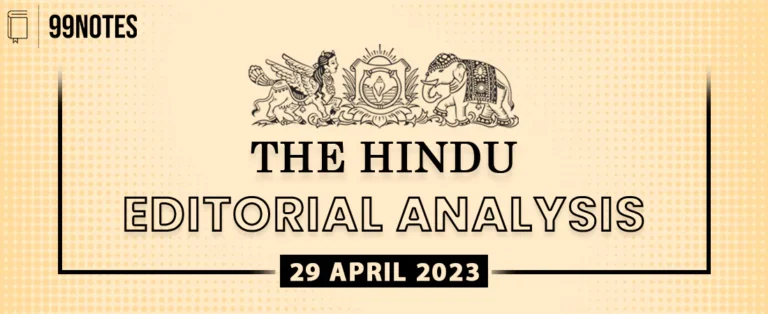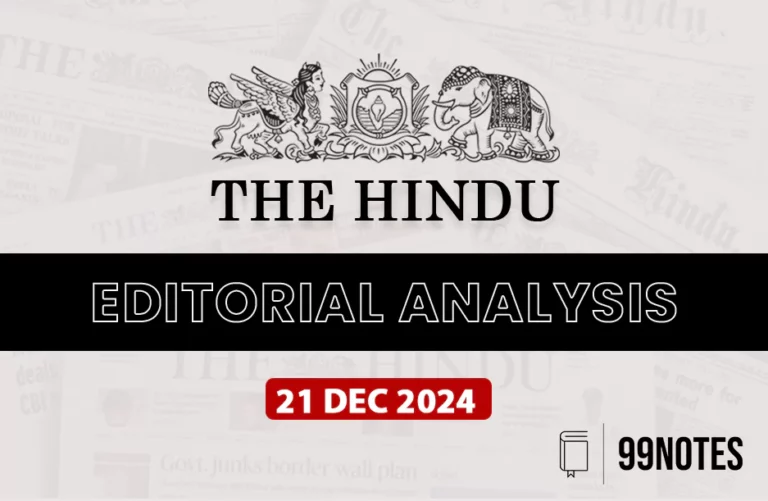11 May 2023 : The Hindu Editorial
The Hindu Editorial
11-May-2023
Daily Current Affairs For UPSC ,The Hindu Editorial Summary
1. A ground view of the Indian Space Policy 2023.
Topic: GS3.
Context:
- The Indian Space Research Organisation (ISRO) released the Indian Space Policy 2023 on April 20, which has been well-received by the industry.
- However, following up with appropriate legislation and establishing clear rules and regulations is necessary.
History of India’s space policy:
- 1st Space age in India: Until the 1990s, India’s space industry was primarily led by ISRO with limited private-sector involvement.
- The Second Space Age began with licensing of private TV channels growth of the Internet, mobile telephony, and smartphones.
Problems with India’s Space Policy
- Low Budget: India’s space economy has grown to over $9.6 billion, while ISRO’s budget is around $1.6 billion. The Indian space industry could reach $60 billion by 2030, creating over two lakh jobs.
- However, an enabling policy environment has yet to be elusive, hindering the growth of the domestic space industry.
- Dependence on Foreign Satellites: The 1997 satellite communication policy and subsequent liberalisations could have generated more enthusiasm for foreign direct investment (FDI). But now, more than half of the transponders beaming TV signals into Indian homes are hosted on foreign satellites, resulting in a significant outflow of funds.
- Problems with current Policies:
- A draft Space Activities Bill was proposed in 2017 but lapsed in 2019, and a new Bill was expected by 2021 but has yet to be introduced.
- The recent Indian Space Policy 2023 provides a policy statement but lacks accompanying legislation and clear rules and regulations.
What is different?
- The policy envisions a flourishing commercial presence in space and emphasises India’s socio-economic development, environmental protection, peaceful exploration, public awareness, and scientific pursuit.
- The document primarily focuses on civilian and peaceful applications, with a separate defence-oriented space security policy expected.
- The roles of the Department of Space, ISRO, IN-SPACe, and NSIL (NewSpace India Limited) are defined in the policy.
- ISRO’s role will shift from manufacturing operational space systems to focusing on R&D in advanced technology and sharing technologies, products, processes, and best practices with non-government entities and government companies.
- NSIL will serve as ISRO’s commercial arm, interacting with the industry, negotiating commercial agreements, and facilitating the smooth transfer of technologies.
Participation of the private sector:
- The Indian Space Policy 2023 allows non-government entities (NGEs), including the private sector, to engage in end-to-end activities in the space sector.
- NGEs can establish and operate space objects, ground-based assets, and related services such as communication, remote sensing, and navigation.
- NGEs can own, procure, or lease satellites, provide communication services within or outside India, and disseminate remote sensing data in India or abroad.
- NGEs can design and operate launch vehicles and establish their infrastructure.
- NGEs are also authorised to make filings with the International Telecommunication Union (ITU) and engage in the commercial recovery of asteroid resources.
- Security agencies can collaborate with NGEs to procure tailor-made solutions for specific requirements.
- IN-SPACe will issue guidelines and regulations to govern the activities of NGEs and act as the single window agency for authorising space activities by government entities and NGEs.
- IN-SPACe will establish a stable and predictable regulatory framework, promote industry clusters, and provide guidelines on liability issues to ensure a level playing field for NGEs.
The gaps in Indian Space Policy 2023:
-
- The Indian Space Policy 2023 lacks a specific time frame for the steps and transitions outlined in the policy. There is no indicative timeline for ISRO’s transition from its current practices or for IN-SPACe to create the regulatory framework.
- Some degree of opacity: Clear rules and regulations are needed for FDI and licensing, government procurement to support new space start-ups, liability in case of violations, and an appellate framework for dispute settlement.
- No Statutory regulatory authority: IN-SPACe requires legislative authority similar to regulatory bodies like the Reserve Bank of India, SEBI, and TRAI, which were established through specific acts.
- Its Position is not clear: Currently, the position of IN-SPACe is ambiguous as it operates under the Department of Space, and the Secretary (Space) also serves as the Chairman of ISRO, the entity to be regulated by IN-SPACe.
Conclusion: The Space Policy 2023 is a visionary document with good intentions. Still, an urgent need exists for a specific time frame and legal framework to effectively implement the policy and propel India into the Second Space Age.
2. Pokhran-II was a transformative moment that brought about a profound realisation.
Topic: GS3.
Context:
- The nuclear tests conducted by India in 1998 marked a significant turning point, boosting India’s self-esteem and position worldwide.
Probems India faced after Pokhran:
- The tests had consequences, including sanctions imposed by the United States, Pakistan’s nuclear tests, and criticism from China.
- The tests reflected a profound epiphany, awakening India’s self-confidence and awareness of its potential.
The nuclearisation of India dispelled three beliefs:
- That the decision was solely made by a ruling government – successive governments were involved in creating a long-term nuclear strategy for India.
- that India would be isolated and economically collapse under sanctions – India saw its best economic rise after 1998.
- and that India and South Asia couldn’t be trusted to manage nuclear weapons – India had been a reliable and responsible nuclear power.
Boost in Self confidence after Pokhran:
- India’s well-thought-out nuclear doctrine, sophisticated command and control structures, and successful implementation of deterrence have proven the effectiveness of its nuclear capabilities.
- India’s leaders showed wisdom and sagacity by developing a credible nuclear deterrent against challenging circumstances, setting an example in the face of nuclear threats in other regions.
- The 1998 tests had a lasting impact on India’s status, security, and influence in the international system.
For Enquiry

12 May 2023 : The Hindu Editorial

12 May 2023 : PIB

12 May 2023 : Daily Current Affairs

11 May 2023 : The Hindu Editorial

10 May 2023 : The Hindu Editorial

9 May 2023 : The Hindu Editorial

11 May 2023 : PIB

10 May 2023 : PIB

9 May 2023 : PIB

11 May 2023 : Daily Current Affairs
The Hindu 12 May 2023 : The Hindu Editorial The Hindu Editorial
12-May-2023
Daily Current Affairs For UPSC ,The Hindu Editorial Summary
Facebook-f
Twitter
Youtube
1.Marriage…
PIB 12 May 2023 : PIB 1.Ministry of Ayush and ICMR sign an MoU to promote and collaborate on integrative health research
Topic:…
Daily Current Affairs 12 May 2023 : Daily Current Affairs 1.Governor’s decision to call floor test wrong: SC
Topic: GS2.
Context:
The Supreme Court ruled that…
The Hindu 11 May 2023 : The Hindu Editorial The Hindu Editorial
11-May-2023
Daily Current Affairs For UPSC ,The Hindu Editorial Summary
Facebook-f
Twitter
Youtube
A…
The Hindu 10 May 2023 : The Hindu Editorial Salvaging the idea and reality of Manipur.
Topic: GS1, GS2 – Indian society and diversity, governance.
Context:
It…
The Hindu 9 May 2023 : The Hindu Editorial The Assembly polls in Karnataka witnessed a voter turnout of 72.68%.
Topic: GS2.
Context:
The Karnataka…
PIB 11 May 2023 : PIB 252 Lakh Metric Ton (MT) wheat procurement done so far.
Topic: GS3.
Context:
As of 9th May, 2023,…
PIB 10 May 2023 : PIB PM applauds infrastructure upgradation in BSF.
Topic: GS3.
Context:
Recently, Union Home Minister…
PIB 9 May 2023 : PIB PM lauds Tripura Government’s decision to go paperless.
Topic: GS2 – governance
Context:
Prime…
Daily Current Affairs 11 May 2023 : Daily Current Affairs The Assembly polls in Karnataka witnessed a voter turnout of 72.68%.
Topic: GS2.
Context:
The Karnataka…




